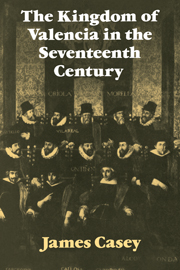Book contents
- Frontmatter
- Contents
- List of illustrations
- Preface
- Abbreviations
- A note on measures
- Map of the kingdom of Valencia
- Introduction
- 1 A long depopulation
- 2 Rich and poor
- 3 The decline of agriculture
- 4 Paying their way in the world
- 5 The seigneurial reaction
- 6 The bankruptcy of the senyors
- 7 The eclipse of the Popular Estate
- 8 The rule of the judges
- 9 Outlaws and rebels
- 10 The loyal kingdom
- Conclusion
- Appendix 1 Fluctuations in the tithes 1500–1700
- Appendix 2 The exploitation of a Valencian senyoriu: the marquesate of Lombay 1559–1700
- Appendix 3 Approaches to a budget for the Dukes of Gandía 1605–99
- Appendix 4 List of viceroys 1598–1700
- Bibliographical note
- Index
- Frontmatter
- Contents
- List of illustrations
- Preface
- Abbreviations
- A note on measures
- Map of the kingdom of Valencia
- Introduction
- 1 A long depopulation
- 2 Rich and poor
- 3 The decline of agriculture
- 4 Paying their way in the world
- 5 The seigneurial reaction
- 6 The bankruptcy of the senyors
- 7 The eclipse of the Popular Estate
- 8 The rule of the judges
- 9 Outlaws and rebels
- 10 The loyal kingdom
- Conclusion
- Appendix 1 Fluctuations in the tithes 1500–1700
- Appendix 2 The exploitation of a Valencian senyoriu: the marquesate of Lombay 1559–1700
- Appendix 3 Approaches to a budget for the Dukes of Gandía 1605–99
- Appendix 4 List of viceroys 1598–1700
- Bibliographical note
- Index
Summary
‘The Valencians are a kingdom in name alone and quite happy to be so’: such was the opinion of a Catalan bishop in 1640, when he advised his compatriots against counting on the support of their brothers south of the Cenia. Undoubtedly there were very powerful forces counteracting any centrifugal tendency in Valencia throughout the Habsburg period. The region was too closely tied to Castile by the bonds of economic self-interest to get involved in a separatist movement. After all, the Valencians could not live without the meat from the meseta and the bread from La Mancha (but more particularly the bread from Sicily, controlled by Castile). The coins which bought that bread also came from the Castilians, for Madrid and Toledo were always the best customers for Valencian silk. Apart from material considerations, there was a less easily definable cultural transition, best symbolized, perhaps, in the decay of the native language and the adoption of standard Spanish. The secretary of the Estament Militar noted in 1639: ‘there was once a time – and not so long ago that I cannot remember it myself – when the Valencian tongue was held in such esteem that if someone began using Castilian in debates … he would be shouted down and told to speak his own language. But now things have changed to such an extent that Castilian is used at almost every meeting’.
- Type
- Chapter
- Information
- The Kingdom of Valencia in the Seventeenth Century , pp. 247 - 256Publisher: Cambridge University PressPrint publication year: 1979



